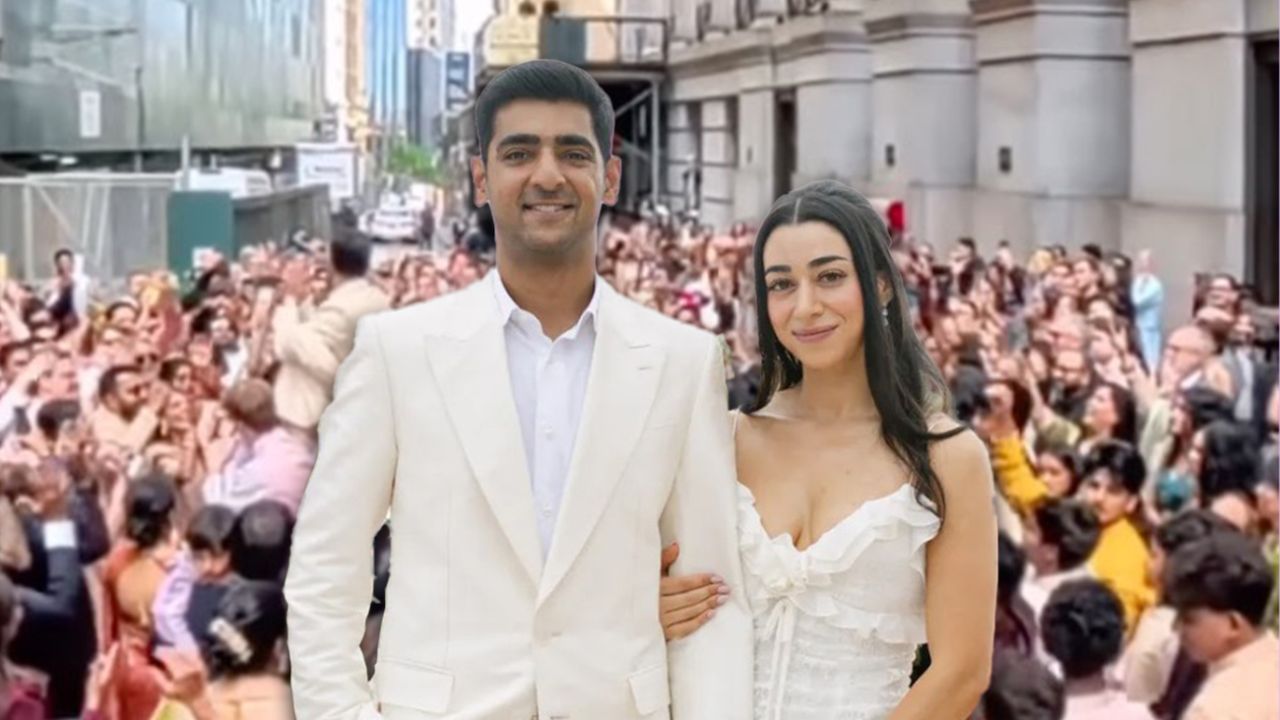Manhattan’s Financial District, usually the realm of stock tickers and power suits, was transformed into a Bollywood dreamscape this past weekend as an Indian-American couple threw a $300,000, four-day wedding celebration that brought Wall Street to a literal standstill.
Hundreds of guests in shimmering saris and embroidered sherwanis danced through the cobblestone streets to the beat of dhol drums and Bollywood anthems during an extravagant baraat—the traditional groom’s wedding procession. Videos from the celebration quickly flooded social media, drawing comparisons to film sets and music videos, while also sparking conversations about a growing trend: the rise of ultra-luxury South Asian weddings in America.
A High-Profile Couple, A High-Octane Celebration
The couple behind the celebration? Varun Navani, CEO of the enterprise AI firm Rolai, and Amanda Soll, a senior legal executive at Mastercard. Public wedding announcements and LinkedIn profiles revealed the duo’s professional pedigree—and their wedding budget reflected it.
Their four-day matrimonial marathon included multiple venue rentals across Manhattan, with 28 city permits filed to close streets and manage the elaborate festivities. Estimated permit fees alone ranged from $25,000 to $66,000 per location, according to city event classifications.
The itinerary:
- Friday: Breakfast at the Conrad Hotel, followed by a sangeet (music and dance night) at The Glasshouse
- Saturday: Multiple meals, a 3:30 p.m. baraat that shut down Wall Street, and a reception at Cipriani until 2 a.m.
- Sunday: A Jewish ceremony at Cipriani and after-party at Slate until 4 a.m.
- Monday: Farewell brunch at the Conrad
Navani, in traditional ivory sherwani and pearl jewelry, was lifted into the air by friends as DJ AJ (@djmumbai) kept the party moving. “We shut down Wall Street for a 400-person Baraat,” the DJ posted. “Who would’ve ever thought?!”
Soll stunned in a deep ruby lehenga by iconic Indian designer Sabyasachi Mukherjee, combining elegance and tradition in a celebration that fused Hindu and Jewish customs.
The New Normal of Big-Fat Indian-American Weddings?
Wedding analysts say Navani and Soll’s wedding is not a one-off. It’s part of a broader trend. According to a 2024 study by Sodjla, a leading South Asian wedding planning site, the average Indian-American wedding with 300–325 guests now costs between $250,000 to $300,000.
Another industry report by Wedding Frontier confirmed similar figures in major cities like Chicago, Houston, and Los Angeles. Alfaaz Photography’s 2025 breakdown placed the broader cost range between $75,000 and $150,000, showing how variable these events can be depending on guest count and venue choices.
What’s consistent is the cultural pressure: “You have to invite everyone you know,” one planner told industry publications. Even “small” Indian weddings usually involve 200+ guests.
This demand has fueled an entire niche industry in the U.S., from high-end lehenga rentals to luxury South Asian bridal magazines like South Asian Bride and Bibi. Even Harper’s Bazaar launched a bridal edition specifically for the South Asian market in 2014.
Tradition Meets Tech and Tabloids
Navani, the AI entrepreneur at the center of it all, represents a generation of South Asian Americans who are both tech-savvy and deeply rooted in cultural heritage. His platform Rolai, founded in 2020, provides AI and professional development services—an emblem of his modern American success story.
His bride, Soll, a senior legal figure at Mastercard, exemplifies a parallel rise of South Asian influence in the corporate legal world. Together, they blend tradition and tech, heritage and modernity.
Their wedding, simultaneously ancient and futuristic, raises a timely question: At what point does cultural celebration become a financial burden?
A Bigger Conversation About Wedding Culture
While the couple could clearly afford their celebration, experts say the pressure to emulate such grand affairs can strain families across all income levels. With social media amplifying wedding expectations, some worry that cultural traditions are being repackaged into performative spectacles.
Yet, the Navani-Soll wedding also underscores the beauty of multicultural fusion in modern America—Hindu customs, Jewish traditions, and New York sophistication all woven together over four days.
As South Asian Americans continue to rise in influence and affluence, weddings like this may become more common—and more controversial. Whether seen as a joyful expression or an extravagant excess, one thing’s certain: this was one Wall Street takeover that had nothing to do with stocks.


